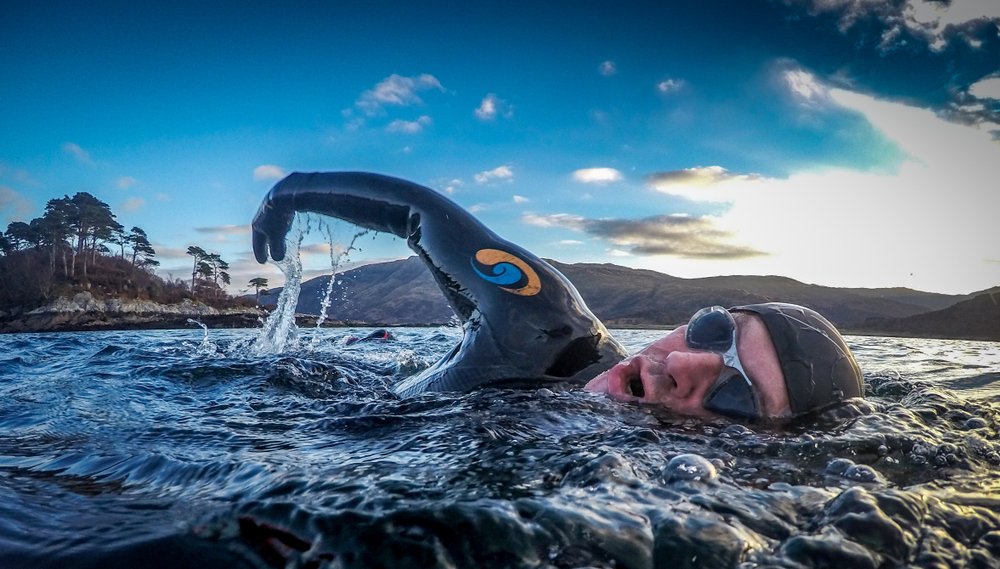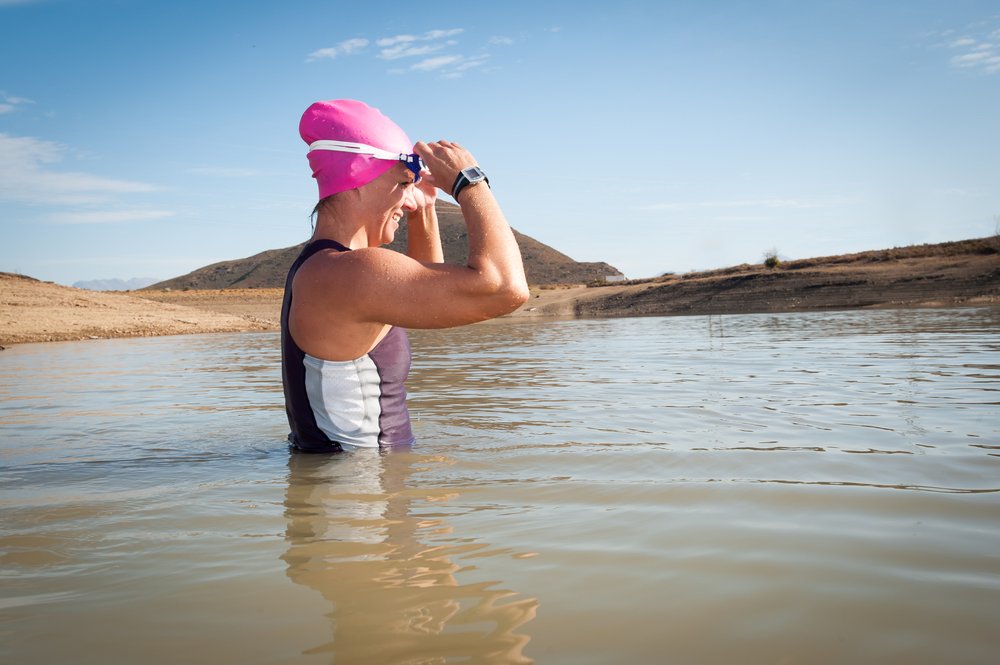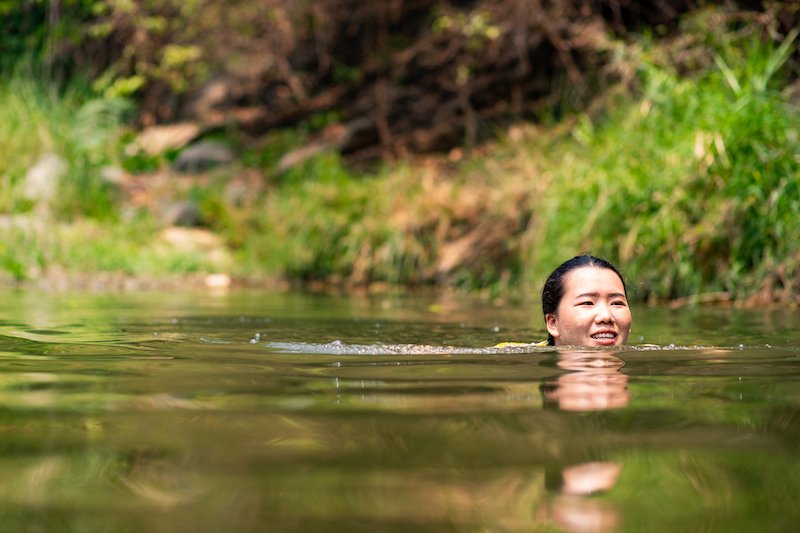Swimming is one of the best overall exercises for health, but what are the added benefits of wild or open water swimming? Dee Marques dives into the subject to discover the physical and mental advantages, plus, she explains the safety tips you need to know.
Swimming is one of the most complete sports you can do that benefits the body. It works the muscles in the upper and lower body and has a beneficial effect on heart health. It’s also one of the most relaxing workouts, so swimming isn’t only good for physical health, but for mental health, too.
I used to enjoy high intensity sports, but I had to take a break after suffering an injury. That’s when I discovered swimming, which quickly became part of my exercise (and relaxation!) routine. Even more recently, I came across wild swimming.
In the UK the concept of wild swimming – also known as open water or outdoor swimming – was popularized by English author and film-maker Roger Deakin. It has since gained a long list of enthusiasts, including some well-known people like the Hollywood film star Katharine Hepburn, and – slightly less glamorously – former UK prime minister David Cameron and his Russian counterpart, Vladimir Putin.
RELATED: Outdoor Meditation: How to Meditate in Nature
Over the past few years the popularity of wild swimming is on the rise. According to the latest statistics, there are approximately 500,000 people in the UK who practise wild swimming regularly, and more than 2 million people prefer outdoor or open water swimming. So, what is it about wild swimming that gets people hooked?
What exactly is wild swimming?
You may already be wondering what is wild swimming exactly anyway, and how is it different from regular swimming. Many of us learn to swim in an indoor pool, and this is where most swimming is done if we live in inland cities. Wild swimming refers to swimming outdoors and not always in places specifically designated for swimming. This can be done in different bodies of water, such as the sea, rivers, lakes, ponds, waterfalls, or outdoor pools.
Wild swimmers often experience a 'high' in the water
Although wild or open water swimming has recently become trendy, it’s far from being new. Roman emperor Julius Caesar was a strong wild swimmer, and the practice became part of military exercises throughout the Middle Ages. Benjamin Franklin used to go wild swimming in the Thames, and personalities like Lord Byron, Charles Darwin, and founder of nursing Florence Nightingale were all strong advocates of wild swimming.
Why open water swimming boosts happiness
Wild swimming is addictive because it gives body and mind an extraordinary boost. During the first few minutes, wild swimmers experience a “high” because their bodies release cortisol after the initial shock of entering cold water. Cortisol is responsible for the so-called runner’s high, which also applies to wild swimmers.
As you become used to swimming in open, non-heated water, your body goes through an adaptation stage where the heart rate and breathing become more controlled. Researchers found that this can also improve resistance to physical and emotional stress, and some even suggest wild swimming as a treatment against depression.
The physical benefits don’t end there. Wild or open water swimming can help decrease inflammation and can kickstart the metabolism because the body starts burning calories to keep itself warm. A study found that open water swimmers who swam during the winter had a higher antioxidant levels, so wild swimming can also strengthen the immune system.
“Wild swimming is addictive because it gives body and mind an extraordinary boost. During the first few minutes, wild swimmers experience a 'high' because their bodies release cortisol.”
This exercise can also be greatly beneficial to mental health as it’s a meditative experience very different from swimming back and forth the same lane in an indoor pool. Evolutionary biologists claim that humans are naturally drawn to being in the water and this is why we share some physical characteristics with marine animals.
For example, we’re the only animals other than whales to have subcutaneous fat that helps us float and stay warm in water, and our bodies are almost hairless – just like those of dolphins – which help us be more agile when swimming. So, it seems that wild swimming can help us reinforce our sense of belonging and oneness with nature.
How can I do wild swimming safely?
If you decide to try open water swimming, you’ll need to follow some safety guidelines to get the most out of it.
Choose a place that you know to be free of pollution. Unfortunately, some water sources are used to discharge industrial or farming waste, so check before you go.
-
Enter cold water very slowly and always keep your head above water level.
- Understand the risks of hypothermia. You may not be able to swim for as long as you normally would if doing it in an indoor or heated swimming pool. The general advice is to be in the water for the same amount of minutes as the water temperature in Celsius. For example, if water temperature is 18C, you shouldn’t swim for more than 18 minutes.

Wild swimming could help alleviate depression shutterstock/Daniel S Edwards
-
Watch out for tide changes if you swim in river estuaries and beaches. Being caught at high tide can leave you trapped, so always swim during “slack tide”, which is the hour before or after a high or a low tide. Tide times or tide charts are usually published in local newspapers or you can easily find them online.
-
Rip currents can pull even the strongest and most experienced swimmers out and entail a high risk of drowning. These currents are common in the ocean and in large lakes (for example in the Great Lakes). Some beaches will have flags indicating the presence of rip currents, but others won’t, so it’s essential you inform yourself before setting out to swim in the ocean.
- Check for algae before going wild swimming. Algae are common in some rivers and lakes, and although not all pose a safety risk, some are toxic and can cause rashes and allergic reactions. Because there’s no way to tell if they’re toxic or not just by looking at them, the advice is to avoid swimming if you see blue-green algae in a body of water.

Check for algae if wild or open swimming in ponds
- Get the right gear. In most cases you won’t need any special gear to go wild swimming. But if you swim in the winter, you will probably need to get a wet suit and to keep hands and feet protected with neoprene boots and gloves. You should also prevent heat loss through the head by wearing a swimming cap and woollen hat or headband over it. Plus, remember to bring warm clothes to change into after the swim.
Since wild swimming is becoming popular, there may even be an open water swimming club in your local area. If so, it’s a good idea to join them and go out in groups so there’s always someone nearby if you’re in trouble or need help.
One last thing to bear in mind is that in some countries there may be legal restrictions as to where you can go wild swimming. There are little to no restrictions in countries with public rights to roam or in locations covered under public right of way, but you still want to check that you’re not trespassing private property.
Wild swimming: the takeaway
Wild swimming can feel like a challenge at first, but its transformational power is something that everyone should experience at least once. As long as you follow some basic safety guidelines, open water swimming has enormous benefits for both body and mind. A stronger immune system, better cardiovascular health, and a natural high that can boost your mood well after the swim are just some of the benefits. So, why not give it a try? •
Main image: shutterstock/AlivePhoto
happiness.com | The fine art of being: learn, practise, share
Are you a happiness.com member? Join free now and:
■ enjoy our happiness magazine
■ share and support in our happiness forum
Written by Dee Marques
 A social sciences graduate with a keen interest in languages, communication, and personal development strategies. Dee loves exercising, being out in nature, and discovering warm and sunny places where she can escape the winter.
A social sciences graduate with a keen interest in languages, communication, and personal development strategies. Dee loves exercising, being out in nature, and discovering warm and sunny places where she can escape the winter.


Join the conversation
You are posting as a guest. If you have an account, sign in now to post with your account.